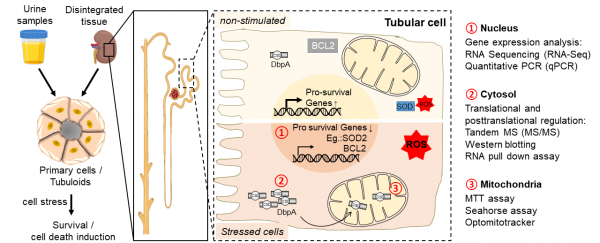Mohammad Zaid Khan

Mohammad Zaid Khan
Former PhD Student
Project 8-3
P8-3: Protective and harmful effects by cold shock protein DbpA in tubular cells
Mohammad Zaid KhanPhD Student
Peter MertensProject Leader |
Acute kidney injury (AKI), affecting over 13 million individuals globally, is a major health concern. Triggered by different insults such as hypotension, ischemia, toxic events and autoimmune diseases AKI develops. The tubular epithelial cell (TEC), due to their high metabolic rate and limited anti-oxidation capacity are one of the major targets. Especially with deprivation of oxygen and ATP tubular necrosis and cell death ensues. Recent evidences link the expression of the major family members of the cold shock protein family with tubular cell phenotypes. One of the cold shock proteins denoted DNA binding protein A (DbpA) is a regulator of mitochondrial function. Its loss correlates with increased ATP synthesis. Therefore, DbpA knockout animals are protected from cell injury. In this project, I will (1) clarify how the DbpA protein is targeted into the mitochondria and whether specific posttranslational modifications prime its mitochondrial shuttling. To this extent test systems will be applied that visualize the shuttling process and allow to narrow-down respective targeting motif(s). Furthermore, (2) inhibition of DbpA expression will be sought by incubating with miRNAs as intervention and cell death analyses will follow. (3) A reporter system with the Luciferase gene inserted in the DbpA gene will allow to visualize and quantify the transcription rate. Once the reporter system is established as cell culture model system (4) screening for drugs with suppressive effect on transcription will be initiated. Finally, (5) three-dimensional tubuloid structures will be established from wild type and DbpA knockout animals to characterize tubular cell phenotypic and growth alterations and effects of tubulo-toxic reagents on cell behaviour. The latter setup will allow to circumvent animal studies and toxins such as cisplatin and crystals will be added for stress tests. Taken together this project is devoted to unravel the functional roles that DbpA plays in tubular cell survival and death.
|
Photos: by UMMD, Melitta Schubert/Sarah Kossmann









